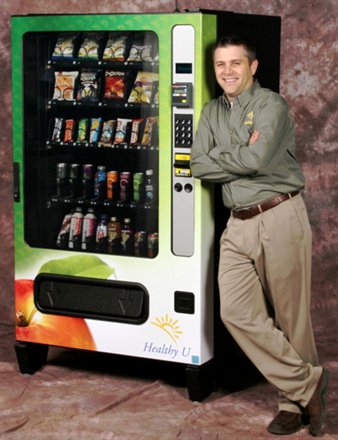A Chicago entrepreneur intent on bringing healthy, local snacks to students and workers is taking a page from industrialized food giants’ playbook by using vending machines to reach snackers.
T Hephner, founder and president of Healthy U, has been installing vending machines filled with nutritious snacks in schools and offices throughout the greater Chicago area and southern Wisconsin for close to two years. The alternative munchies to typical vending machine fare of Doritos and Cheetos, Pepsi and Gatorade include granola bars and baked potato chips, organic teas and vitamin water. His standards exclude any foods made with trans fats, partially hydrogenated oils, high-fructose corn syrup, or artificial sweeteners, preservatives or colors.
Mr. Hephner incorporates locally-sourced foods in his lineup. Some of his brands include baked cheese curls and cheese puffs from Michael Season’s, based in Addison, and granola bars from Nature’s Path, a Canadian company with operations in Wisconsin that blends local ingredients into its bars.
After 13 years of working on the business side of pharmaceutical clinical trials and witnessing people with escalating health problems related to obesity, Mr. Hephner decided to get on the preventive side of the health equation. He did research and discovered almost no one was offering healthier food selections through vending machines despite growing consumer interest in nutritious snacks.
In particular, Mr. Hephner wanted to target schools to encourage better eating habits among kids. His timing may be just right to generate interest among school administrators: Congress recently passed the Healthy, Hunger-Free Kids Act of 2010, which calls for schools to boost good nutrition for low-income students.
So far, he has signed contracts for 52 locations, with about 70% of them in workplace settings and the remainder in schools. Revenues from students have outpaced those from their grown-up counterparts: More than two-thirds of sales have come from schools, Mr. Hephner says. The company intends to have its machines in 100 locations by yearend and he expects revenue to double from the year before. Mr. Hephner hopes to be profitable by yearend.
Healthy U, based in McHenry, also is branching out into community-supported agriculture. He has begun delivering boxes of local produce from Chicago-based distributors, such as Goodness Greeness, to drop-off locations in the city and suburbs for consumers who want food from local sources conveniently delivered to their homes or businesses. This spring, Mr. Hephner hopes to begin working directly with McHenry County farmers as well.
Crain’s spoke with Mr. Hephner, 37, to find out more.
Crain’s: Why are you so keen about getting healthier snack choices out to people through vending machines?
Mr. Hephner: We’re passionate about bringing the message of how the industrialization of food is ruining our diets and contributing to health problems like diabetes and obesity. My wife and I started eating organic foods and we wanted our four young boys (aged between 5 and 11) and all other kids to have better food choices at school, since that’s where they spend most of their time.
We hit on this idea of vending machines because what’s in those machines at schools is industrialized junk food that’s bad for them. Kids are adaptable to eating healthier, so we wanted to put vending machines in schools with better quality foods. We hope school administrators agree with us. We think adults will make better food choices if they have healthier options at work, too.
Is it a tough sell convincing school administrators and company owners to replace junk food machines with your healthier options?
We don’t recommend they remove junk food machines. It’s better to give people an alternative and make them think about their food choices. We also do taste tests so they know what we offer.
We come in and talk to the human resource departments in businesses and to administrators at schools about the health benefits of our foods. We explain what we’re trying to do. It’s not just about bringing in good snack foods. We may be part of a wellness program that a company is implementing or expanding.
Don’t some vending machine contracts forbid proprietors from bringing in competing snack options?
We’re so different from other vending machines that the schools can make exceptions. Some started us side-by-side to the junk food vendor, then didn’t re-sign the junk food contracts when the existing ones expired. We can’t buy the schools new gym floors and score boards like the other vendors can, but we offer other benefits, such as revenue-sharing with some schools and non-profits.
Where do you envision future growth for your company?
We expect our major growth in the next couple years will be in colleges. College students in their early to late 20’s are the best market for these kinds of products. They’re educated and they’ve grown up with the organic, natural food movement. We see ourselves expanding beyond Chicago to Ann Arbor, Mich., and Austin, Texas.
Is it tough to be a green company when you have to use so much fuel to drive around and refill all those vending machines?
It’s true that we drive around a lot, but we’re exploring biodiesel fuel for our vehicles. We’re green in other ways, though. Our vending machines are energy efficient and Energy Star-compliant. They use one-eighth of the power of a regular vending machine because they have LED lights and high-efficiency compressors for refrigeration. We also give priority to local manufacturers and snack vendors.


